뉴스&스피킹(영자신문)
하루 10분이면 영어에 대한 두려움을 극복하고 누구나 유창하게 영어를 구사하실 수 있습니다.
-
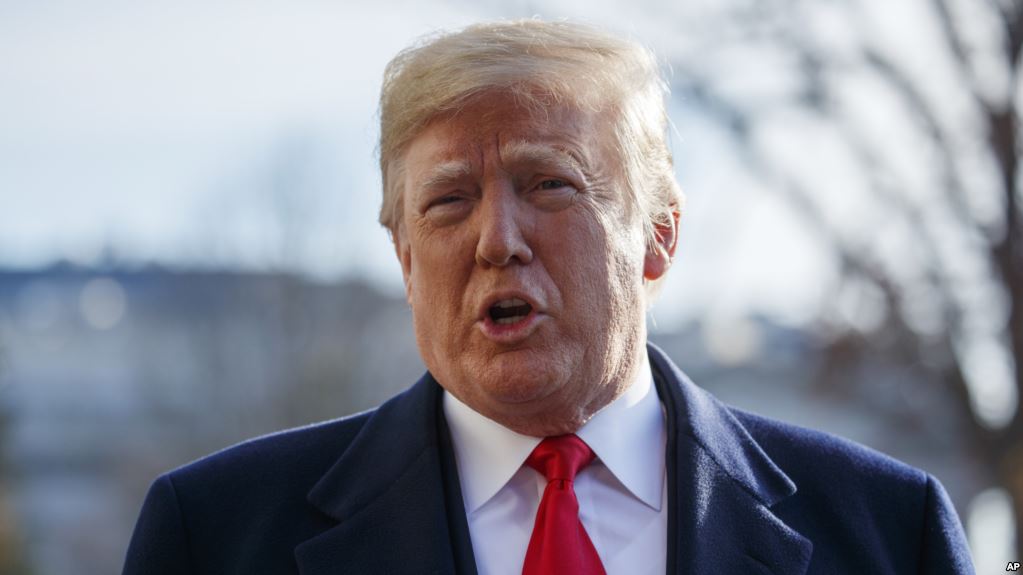 Trump Announces New Attorney General and UN Ambassador Picks United States President Donald Trump announced Friday that he will nominate former attorney general William Barr to lead the Justice Department. Trump told reporters that Barr was “my first choice since day one.”
Trump Announces New Attorney General and UN Ambassador Picks United States President Donald Trump announced Friday that he will nominate former attorney general William Barr to lead the Justice Department. Trump told reporters that Barr was “my first choice since day one.”
Barr held the same position from 1991 to 1993 under former President George H.W. Bush.
Trump also said he would nominate Heather Nauert as U.S. Ambassador to the United Nations. Nauert is the current State Department spokeswoman. She also is acting undersecretary of state for public diplomacy and public affairs.
Trump said Nauert is “very talented, very smart, very quick.”
Barr confirmed that he had accepted the president’s nomination. He is currently a business lawyer. Barr will replace acting Attorney General Matthew Whitaker who was appointed last month after Jeff Sessions resigned.
Both the attorney general and U.N. ambassador positions require Senate confirmation. Trump said he hopes the process would be completed quickly, but Congress closes for its winter break in one week. The newly-elected Senate is seated on January 3.
Barr will have to answer questions at his confirmation hearing about the special counsel investigation into Russian influence in the 2016 presidential election. That investigation is being led by Robert S. Mueller III.
Democratic Sen. Richard Blumenthal serves on the Judiciary Committee that will question Barr. He said in a statement that he would “demand that Mr. Barr make a firm…commitment to protect the Mueller investigation, operate independently of the White House, and uphold the law.”
The investigation, and the Justice Department’s supervision of it, have angered the President.
Trump dismissed his former attorney general, Jeff Sessions, partly because Sessions had removed himself from the investigation.
Trump renewed his attacks on Friday, tweeting that he planned to do “a major Counter Report to the Mueller Report.”
“This should never again be allowed to happen to a future President of the United States!” Trump wrote.
The Mueller investigation appears to be nearing its end.
The Trump administration expects that Barr’s nomination will be well-received by Republicans, who respect his experience. Officials also hope Democrats might consider Barr a traditional republican with no personal ties to the president.
Nauert joined the State Department in 2017 after working as a TV reporter for Fox News. The 48-year-old spokesperson would replace U.N. Ambassador Nikki Haley, who announced she was leaving the position at the end of the year.
Nauert has joined Secretary of State Mike Pompeo on several international trips.
Nauert would be responsible for voicing the administration’s foreign policy positions to diplomats at the U.N.
Among those are continued support for Israel and for economic sanctions against North Korea and Iran.
If she accepts the position, Nauert will most likely face difficult questions from the Senate about her lack of experience as a diplomat.
I’m Susan Shand.View -
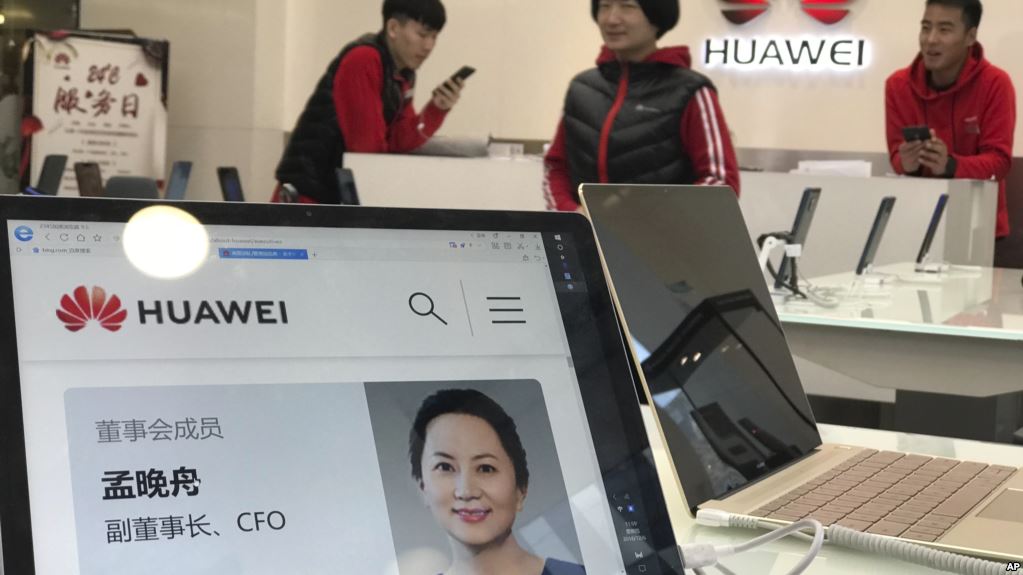 US, China Look to Limit Impact of Tech Head's Arrest BEIJING —
US, China Look to Limit Impact of Tech Head's Arrest BEIJING —
With many questions still unanswered, governments in both the United States and China appear to be working to limit the fallout from the arrest of a top Chinese technology executive and its possible impact on trade negotiations.
News of the detention in Canada of Meng Wanzhou, tech giant Huawei's chief financial officer, rocked markets across the globe. Many were quick to voice concern that the move could derail trade talks, and it came as both sides were hailing last weekend's meeting between U.S. President Donald Trump and China's Xi Jinping as a "big success."
So far, Trump and his administration have been strangely quiet on the topic, analysts said.
Christopher Balding, a China scholar at Fulbright University Vietnam, said that from China's perspective, Meng's arrest was a political escalation and the Trump administration seemed to understand that.
"I think it is going to be very important that they say that these are the relevant laws, that they try to remove politics from this as much as possible, whatever the exact specifics of the case are," Balding said.
"Even if this was completely and entirely divorced from anybody in the Trump administration, Beijing is going to receive it as a significant political escalation," he said.
Ming Xia, a professor of political science and global affairs at City University of New York, said Meng's arrest was another example of how members of Trump's trade team know how to use very sharp, pinpoint moves to teach China a lesson.
"This is one of the U.S.'s many tactics and tools used in its trade war with China to maximize its gains. The arrest of Meng Wanzhou, I believe, should be seen in the context of the Sino-U.S. trade war," Ming said.
For now, both sides have expressed their confidence that the agreement reached last week was a good one and their hope that it will be a success. How Meng's case will play out remains to be seen.
China has demanded the chief financial officer's release and labeled her detention a "gross violation of human rights." Huawei has said "the company has been provided with little information regarding the charges and it’s not aware of any wrongdoing by Ms. Meng."
At a hearing Friday in Vancouver, a Canadian prosecutor argued that Meng — who has spent most of the past week at a women's detention facility in a suburb of Vancouver — should be denied bail pending possible extradition to the United States because she was a flight risk.
SkyCom
A prosecutor disclosed that Meng was wanted by the United States for allegedly deceiving financial institutions about the relationship between Huawei and another tech company, SkyCom, based in Hong Kong, that is alleged to have sold U.S.-manufactured technology to Iran, in violation of U.S. trade sanctions.
A judge is to rule on the bail request Monday.
Reports from Reuters have previously suggested that over the past decade, Huawei has struck deals to resell embargoed technologies, owned by U.S. companies including Hewlett-Packard, to sanctioned telecom operators in Iran.
Chinese state media have argued that the United States was abusing the law to hurt Huawei's international reputation. However, concerns about Huawei have been growing for quite some time. Many view Huawei as a national security and privacy threat due to its close links to the Chinese government.
On Friday, there were reports that Tokyo appeared to be the latest country that plans to ban the purchase of Huawei products.
Earlier this week, Britain's BT Group announced that it was removing Huawei Technologies equipment from 3G and 4G networks as well as banning it from core parts of the coming 5G network. Australia and New Zealand also have similar bans in place regarding fifth-generation networks.
On Thursday, The Wall Street Journal reported that a federally appointed monitor at HSBC Holdings flagged suspicious transactions in Huawei accounts. That information was passed on to federal prosecutors in the Eastern District of New York, the Journal report said.
Regardless of what violations might have occurred, it makes sense to go after Meng, CUNY'S Ming said.
"As the company's vice president and chief financial officer, Meng Wanzhou would have been the one who signed off on all documents," Ming said.
'Moral support' for Huawei
What China might do in response remains unclear. State media have suggested that society should offer Huawei some "moral support," such as buying the company's products.
Some have noted that U.S. tech executives would be wise to avoid traveling to China over the next two weeks, out of concern that they might get caught up in the tug of war over Huawei.
Fulbright University Vietnam's Balding said the concerns make sense but added that China has also been getting very savvy at how it responds, finding more discreet ways to get even.
"Maybe they will just hack an American tech firm and take their IP [intellectual property] or something like that," Balding said.
"To bring a trumped-up charge [against a U.S. tech executive], I think, would be very embarrassing for China internationally and really just reveal its true colors more."View -
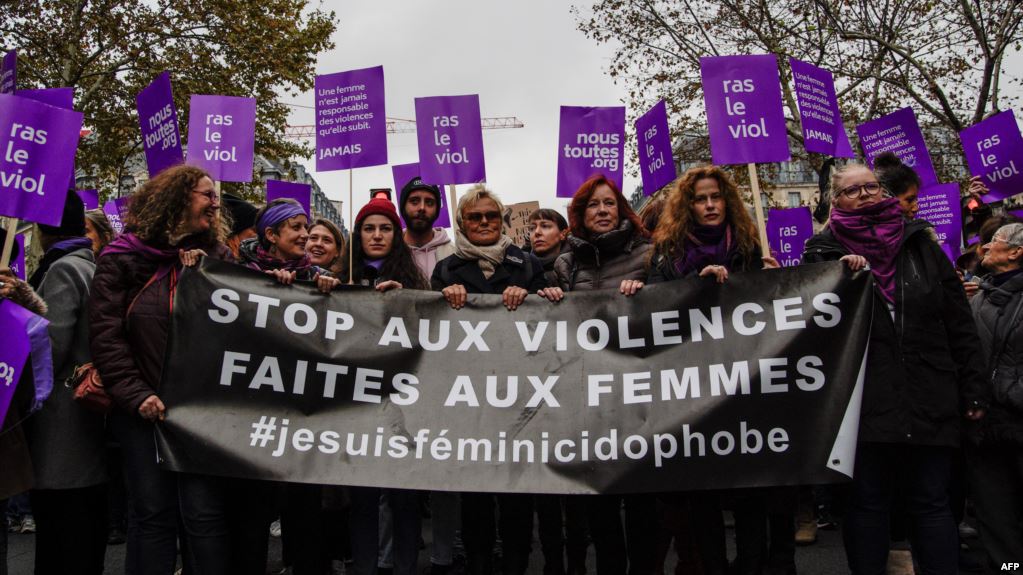 Home: Most Dangerous Place for Women From VOA Learning English this is the Health & Lifestyle report.
Home: Most Dangerous Place for Women From VOA Learning English this is the Health & Lifestyle report.
The most dangerous place for a woman is not a dark street in a strange city. It is not in a war zone or a protest.
The most dangerous place for a woman is in her own home.
So says a new study from the United Nations Office of Drugs and Crime. The study found that intimate partners or family members are responsible for the majority of female killings around the world.
The study explains that the majority of murder victims are men. But their killers are usually strangers. Women, the report states, are far more likely to be murdered by someone they know.
In 2017, about 87,000 women around the world were murdered. More than half of them, 58 percent, were killed by intimate partners or family members. Thirty percent of those murders were carried out by current or former lovers.
The report found that often these murders are not random. Rather, they are usually the result of past gender-related violence against the victim.
When an intimate partner murders a woman, the report states that jealousy and fear of abandonment are among the reasons.
However, it adds that women “are also killed by fathers, brothers, mothers, sisters and other family members because of their role and status as women.”
This kind of killing is often called femicide.
Where femicide is most likely
In 2017, Asia had the largest overall number, at 20,000, of women killed by intimate partners or family members. Africa followed with 19,000. Then came the Americas with 8,000 murders; Europe had 3,000 and Oceania had 300.
However, based on population, Africa and the Americas are the parts of the world where women are most at risk of this crime. The study found the rate in Africa is 3.1 per 100,000 female population.
In 2017, the intimate partner/family-related homicide rate was also high in the Americas, at 1.6 per 100,000 female population.
Europe is the area where the risk is lowest.
Solutions
The study shows that deadly violence against women is on the rise.
The U.N. study experts suggest ways to fight the problem. These include improvements to criminal justice systems and how they deal with violence against women. They suggest that severe punishment for acts of violence against women will help.
They call for greater cooperation between police and justice systems and between health and social services.
The experts also claim that men need to be included in the battle against femicide. Educating boys and teens, they say, is an important part of the solution.
And that is the Health & Lifestyle report. I’m Anna Matteo.
Anna Matteo wrote this story. Caty Weaver was the editor.View -
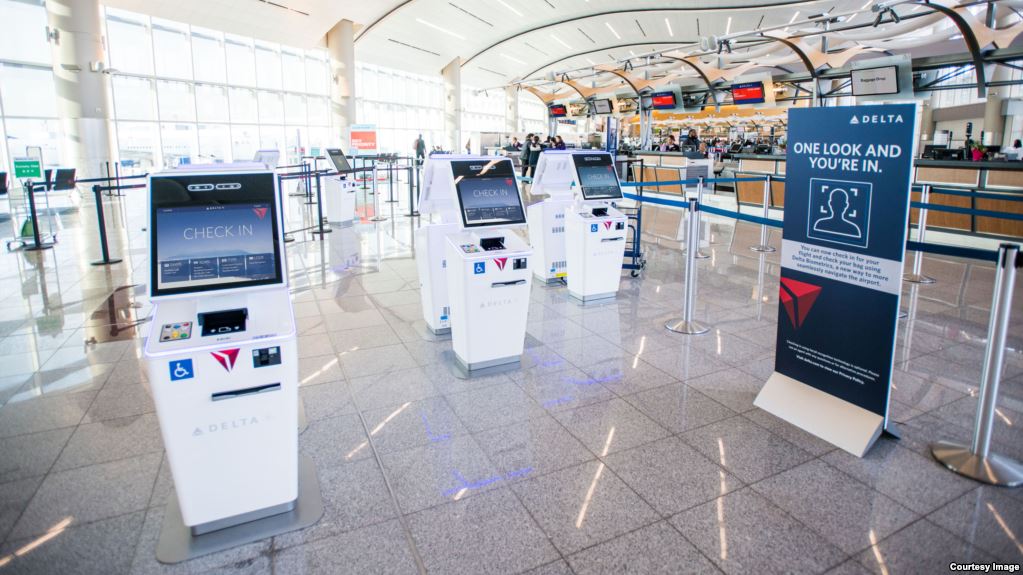 First US Face Recognition Terminal Opens at Atlanta Airport A United States airport has become the first in the nation to permit passengers to use facial recognition technology to get on flights.
First US Face Recognition Terminal Opens at Atlanta Airport A United States airport has become the first in the nation to permit passengers to use facial recognition technology to get on flights.
The system launched last week at Hartsfield-Jackson Atlanta International Airport in the state of Georgia.
The technology can be used by international passengers traveling through a special terminal. Atlanta’s Hartsfield–Jackson Airport usually ranks as the world’s busiest airport based on the number of passengers.
The terminal is operated by Delta Airlines. But it also serves passengers flying on international carriers Aeromexico, Air France, KLM and Virgin Atlantic Airways.
Delta said in a statement it is the first fully biometric airport terminal to operate in the U.S. The goal of the system is to simplify and speed up the process of presenting documents to get on a flight. The company says passengers can begin using the facial recognition system when they first arrive at the airport.
After the first check-in, passengers can also use face recognition to pass through security and to get on the plane. Delta says the system prevents the need for travelers to present their passport up to four times during the usual check-in process.
Travelers look into a camera that scans their face. This image is then compared against a collection of pictures kept by the U.S. Customs and Border Protection. The agency collects face scans from passports and visas.
The system, however, has raised concerns about privacy. Earlier this year, two U.S. lawmakers sent a letter to the Department of Homeland Security, which is home to the border protection agency.
Senators Ed Markey of Massachusetts and Mike Lee of Utah urged that official rules be put in place before the program is expanded. Official rules, the senators said, would help Americans understand and accept the program.
Jeramie Scott is a lawyer with the Electronic Privacy Information Center. He has called the use of facial recognition at U.S. airports a “massive threat.”
Scott placed a statement on Twitter. He said his fear is that the government’s facial recognition database of citizens could be used for other purposes without an individual’s permission.
“The government now has the power to identify you whenever it wants, without your consent, and even without your knowledge,” he said.
Scott added that through facial recognition, the government has created “a digital ID of millions of Americans.” He added: “And they did this without a public discussion or consent – taking photos collected for one purpose and using it for another.”
John Wagner is deputy executive assistant commissioner of U.S. Customs and Border Protection, or CBP. He told CBS News any U.S. citizen who has privacy concerns can choose not to take part in the facial recognition system. He said this would prevent the airline from collecting a face scan to compare with CBP records.
The CBP says its policy is to remove photos of U.S. citizens from its system once their identities have been confirmed.
Delta says about two percent of passengers using the Atlanta airport terminal have chosen not to use the facial recognition system. Next year, the airline plans to expand its biometric system for international travelers at Detroit Metropolitan Airport in Michigan.
I’m Bryan Lynn.View -
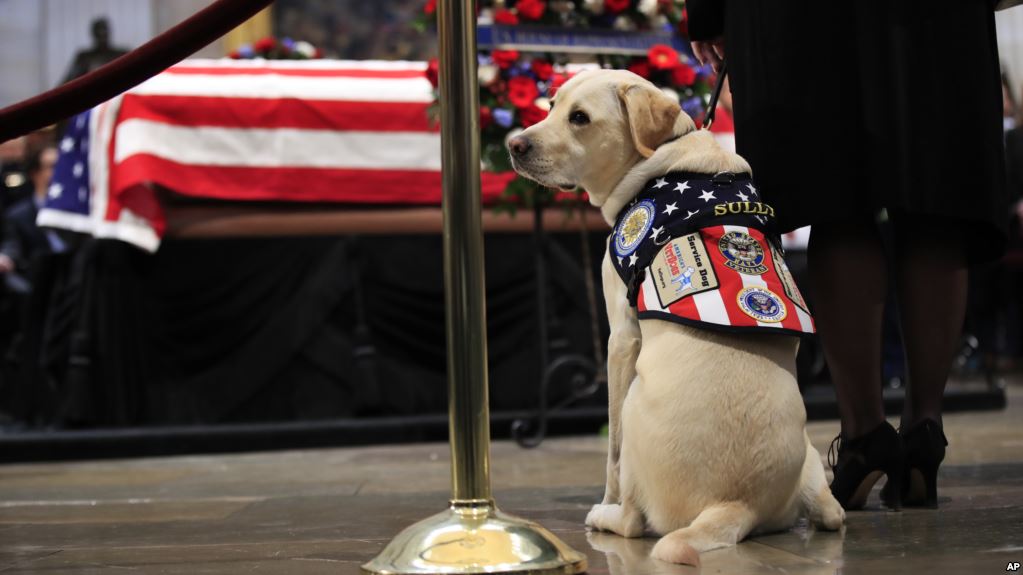 George H.W. Bush's Service Dog Sully Stays by His Side The body of America’s 41st president, George H.W. Bush, has been placed inside the U.S. Capitol building. People began lining up in the early morning hours Tuesday for the chance to honor Bush, who died Friday at the age of 94.
George H.W. Bush's Service Dog Sully Stays by His Side The body of America’s 41st president, George H.W. Bush, has been placed inside the U.S. Capitol building. People began lining up in the early morning hours Tuesday for the chance to honor Bush, who died Friday at the age of 94.
All day, thousands of people walked by his flag-covered casket. Alongside them was someone that came into Bush’s life only recently: his service dog, Sully. Bush received Sully in June from America's VetDogs, an organization that trains dogs to help war veterans and active military members.
Bush was a pilot for the U.S. Navy during World War II. His plane was shot down during a bombing mission over the Pacific Ocean. Later in his life, he developed a form of Parkinson’s disease. He used a wheelchair in his final years.
Sully, a two-year-old yellow Labrador retriever, helped the former president do things such as open and close doors, pick up objects and seek help if needed.
But above all, the dog was a “wonderful companion,” said Bush aide Evan Sisley. Bush got Sully just two months after the death of his wife of 73 years. Barbara Bush died in April at the age of 92.
Sully has remained by Bush’s side since his death Friday. On Sunday night, Bush spokesman Jim McGrath shared an emotional photo of the loyal dog lying on the ground in front of Bush’s casket.
“Mission completed,” McGrath wrote, along with the hashtag #Remembering41. The image has been shared more than 65,000 times.
When Bush first got Sully, he wrote about the dog on Twitter. He said, “A great joy to welcome home the newest member of our family, “Sully,” a beautiful -- and beautifully trained -- lab from @AmericasVetDogs. Could not be more grateful...”
America’s VetDogs says Sully will soon begin working at Walter Reed National Military Medical Center’s Facility Dog Program. The medical center is just outside of Washington, D.C. There, Sully will help wounded soldiers as they go through physical therapy and other treatments.
George W. Bush, America’s 43rd president and son of George H.W Bush, made note this week of the happiness Sully brought to his father.
The younger Bush wrote on Instagram, “As much as our family is going to miss this dog, we’re comforted to know he’ll bring the same joy to his new home, Walter Reed, that he brought to 41.”
And that’s What’s Trending Today.
I'm Ashley Thompson.View

